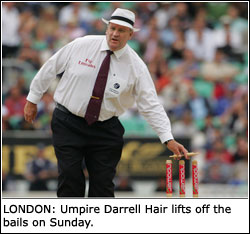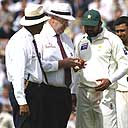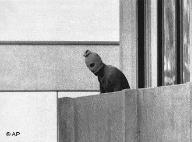
Hair Again: Just not cricket
The fourth Test between England and Pakistan got mired in unprecedented controversy with the Pakistani side refusing to take field after the tea session on day 4. The apparent angst of the Pakistani side was the decision taken by the on-field umpires – Darrell Hair and Billy Doctrove regarding ball tampering by the Pakistani team. The registered protest against the decision saw the team virtually boycott the final session of the match and ultimately led to the ICC awarding the match to England after declaring that the Pakistanis had forfeited. This is not the first time that Hair has been in the middle of a cricketing controversy; in fact he is a regular hell-raiser with many teams, especially those of the sub-continent. The most famous of spates came in Sri-Lanka-Australia Series in 1995, where offie Mutthiah Muralitharan was no-balled repeatedly for chucking. Many have questioned Murali’s bowling action, but the whole issue of chucking came to light thanks to Hair’s actions. While the media in the sub-continent were quick to cast Hair as a racist, the Australian and western media were of the view that Murali’s action does warrant some correction. The controversial Hair has once again resurfaced and has drawn a wide range of reactions from the world over. However, in defense of Hair, one could argue that ultimately, the decision taken by the on-field umpires is final; any redressal of the decision should be taken at appropriate levels rather than resorting to dissent. Concurrently, once can also argue that Hair has to be some sort of an eagle eye to come to a judgment on whether the five and half ounces of leather was tampered with or not!

This issue has moved on from the playing field to the larger cultural turmoil and misunderstandings that we live in. The entire controversy would have been a non-starter of sorts had it not been for an Asian, and more pointedly a Muslim nations, team taking on the mostly Christian English side. While I would be the last person to advocate such a thought process, to type cast sportspersons on basis of religion, it is an uncomfortable truth all of us have to deal with. The past few weeks saw the threat of British-Pakistanis wanting to blow up airplanes. Also the 7/7 bombings still remain fresh in every one’s minds. Couple this with the broad sense of victimization the Muslim community feels post 9/11, and you have situation where a sporting controversies becomes the clichéd clash of the civilizations. The refusal to take the umpire’s decision in their stride gave a sense of rigid intolerance towards decisions not going your way to the largely white audience. To their minds this is what they equate Islam with – rigidity and intolerance. This mindset allowed many spectators to boo the Pakistani side without understanding the nuances of the hold up in play. Likewise, the umpire’s objection to the alleged ball tampering was seen by the Pakistani side as the white man being unjust to them because of who they are and where they come from. So, the incident in a very ironic sense displayed the times we live in, a time of misunderstandings and growing intolerance towards religions, ethnicities and race.
A Black September Militant

Purists would like to refrain from getting politics into sport. But realistically, any sport historian would point to the innumerable examples of national and international politics and events having an effect on sport. The boycott of the Berlin Olympics by the allied group of nations during World War 2, or the ban on the South African cricket team during the Apartheid era are well
documented. More sinisterly, the massacre of Israeli athletes in Munich during the 1978 games by the Palestinian group Black September have haunted sport till date. The Indians did not play Pakistan for many years during the hostilities in the late nineties.
As one can see at no time in sporting history has politics and global realities not affected the sporting field. The quicker one accepts it; more quickly can one use sport as a tool to disarm mental hostilities and biases against one another. Till then more Zidane’s will heat-butt Materazzi’s and more teams will walk out when they feel wronged just because they belong to a region or religion.

0 Comments:
Post a Comment
<< Home